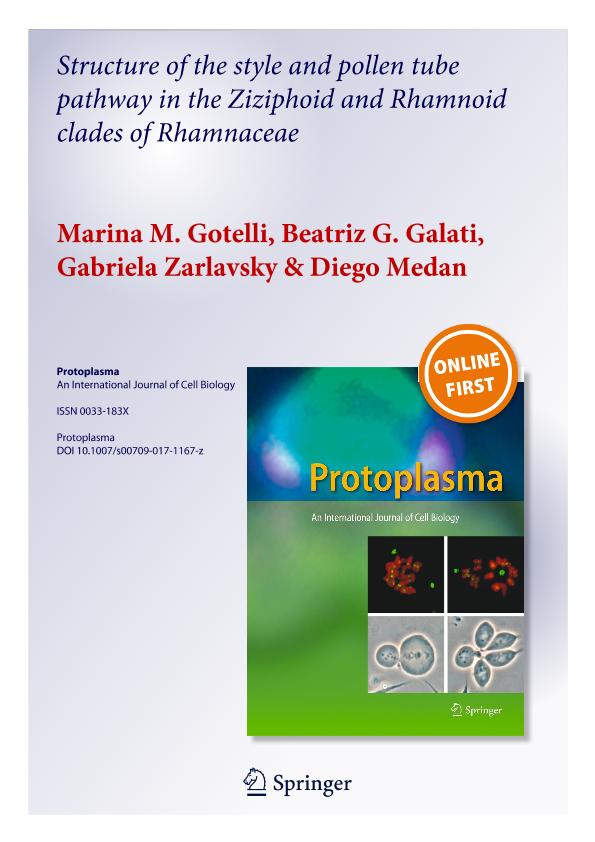Mostrar el registro sencillo del ítem
dc.contributor.author
Gotelli, Marina María

dc.contributor.author
Galati, Beatriz Gloria

dc.contributor.author
Zarlavsky, Gabriela Elena

dc.contributor.author
Medan, Diego

dc.date.available
2018-08-15T16:00:10Z
dc.date.issued
2018-03
dc.identifier.citation
Gotelli, Marina María; Galati, Beatriz Gloria; Zarlavsky, Gabriela Elena; Medan, Diego; Structure of the style and pollen tube pathway in the Ziziphoid and Rhamnoid clades of Rhamnaceae; Springer Wien; Protoplasma; 255; 2; 3-2018; 501-515
dc.identifier.issn
0033-183X
dc.identifier.uri
http://hdl.handle.net/11336/55615
dc.description.abstract
The ultrastructure of the style and pollen tube pathway before, during and after anthesis were studied in 13 species belonging to the tribes Pomaderreae, Paliureae, Colletieae and Gouanieae (Ziziphoid clade) and Rhamneae (Rhamnoid clade) using light microscopy and transmission electron microscopy. The aim of this study is to provide new morphological characters useful for phylogenetic analysis at suprageneric level in Rhamnaceae. The patterns of pollen tube growth and the ultrastructural changes undergone by cells of the style were also described. Species of Rhamneae (Scutia buxifolia and Condalia buxifolia) have a solid style, with the transmitting tissue forming three independent strands (S. buxifolia) or a central, single horseshoe-shaped strand as seen in transversal section (C. buxifolia) which could derive from the fusion of formerly independent strands. In contrast, Pomaderreae, Gouanieae and Paliureae showed semi-solid styles, while in Colletieae, as previously reported, the style is hollow with two or three stylar canals. The style anatomy and the ultrastructure of the pollen tube pathway show that there is a tendency towards a solid style with a single strand of transmitting tissue within the family. The three-canalled hollow style could be the plesiomorphic state of the character “type of style” in the family, the semi-solid style the synapomorphic state and the solid style with three strands of transmitting tissue the apomorphic state, with the solid style with a single strand of transmitting tissue as the most derived state. Therefore, Colletieae would be the most basal tribe of the Ziziphoid clade.
dc.format
application/pdf
dc.language.iso
eng
dc.publisher
Springer Wien

dc.rights
info:eu-repo/semantics/openAccess
dc.rights.uri
https://creativecommons.org/licenses/by-nc-sa/2.5/ar/
dc.subject
Phylogenetic Analysis
dc.subject
Rhamnaceae
dc.subject
Rhamnoid Clade
dc.subject
Style Ultrastructure
dc.subject
Ziziphoid Clade
dc.subject.classification
Otras Ciencias Biológicas

dc.subject.classification
Ciencias Biológicas

dc.subject.classification
CIENCIAS NATURALES Y EXACTAS

dc.title
Structure of the style and pollen tube pathway in the Ziziphoid and Rhamnoid clades of Rhamnaceae
dc.type
info:eu-repo/semantics/article
dc.type
info:ar-repo/semantics/artículo
dc.type
info:eu-repo/semantics/publishedVersion
dc.date.updated
2018-08-14T18:39:43Z
dc.identifier.eissn
1615-6102
dc.journal.volume
255
dc.journal.number
2
dc.journal.pagination
501-515
dc.journal.pais
Austria

dc.journal.ciudad
Viena
dc.description.fil
Fil: Gotelli, Marina María. Universidad de Buenos Aires. Facultad de Agronomía. Departamento de Recursos Naturales y Ambiente; Argentina. Consejo Nacional de Investigaciones Científicas y Técnicas; Argentina
dc.description.fil
Fil: Galati, Beatriz Gloria. Universidad de Buenos Aires. Facultad de Agronomía. Departamento de Recursos Naturales y Ambiente; Argentina
dc.description.fil
Fil: Zarlavsky, Gabriela Elena. Universidad de Buenos Aires. Facultad de Agronomía. Departamento de Recursos Naturales y Ambiente; Argentina
dc.description.fil
Fil: Medan, Diego. Universidad de Buenos Aires. Facultad de Agronomía. Departamento de Recursos Naturales y Ambiente; Argentina. Consejo Nacional de Investigaciones Científicas y Técnicas; Argentina
dc.journal.title
Protoplasma

dc.relation.alternativeid
info:eu-repo/semantics/altIdentifier/doi/http://dx.doi.org/10.1007/s00709-017-1167-z
dc.relation.alternativeid
info:eu-repo/semantics/altIdentifier/url/https://link.springer.com/article/10.1007%2Fs00709-017-1167-z
Archivos asociados
